nucleargraduates: 10 years of achievement
Published 11 October 2018
Background:
Created and established by the Nuclear Decommissioning Authority (NDA) in 2008 with a £5million investment, the nucleargraduates programme is the most comprehensive graduate scheme the industry has ever seen.
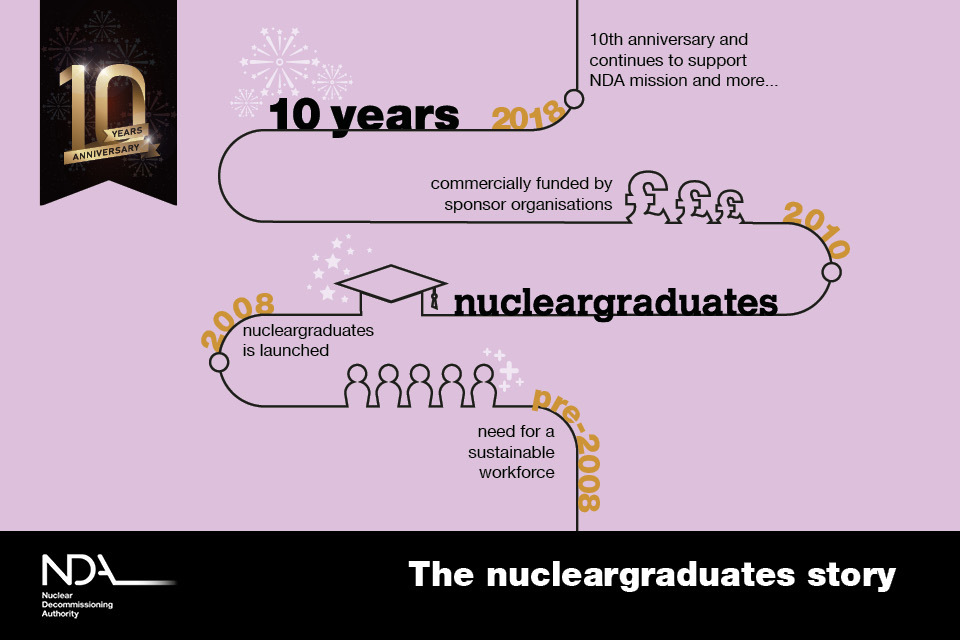
The nucleargraduates timeline
It was set up to promote the breadth of opportunities available in the UK nuclear sector and increase the number of graduates in the industry – and this year it celebrates its 10th anniversary.
nucleargraduates 10 Years of Achievement
Support for NDA’s mission:
The UK’s nuclear industry is facing its biggest challenge in decades. Existing power stations near the end of their working lives are ready to be decommissioned, while a new wave of plants has been given the go ahead. Nuclear is back on the agenda. The factors behind this resurgence are complex, but one thing is clear – the need for suitably skilled graduates from the UK is greater than ever.
Engineers, scientists, business minds, talented managers, financial and IT experts will all be essential to the future of this sector.
The NDA has a major role to play in ensuring there is a sustainable workforce to achieve its mission. Developing a world-class graduate programme, supported by a host of like-minded partners, is a significant part of fulfilling that objective.
Developed following a comprehensive review of existing opportunities and schemes, combined with stakeholder consultation to seek out best practice, the nucleargraduates programme offers a unique approach towards professional development and gaining industry experience.
Nucleargraduates is managed on behalf of the NDA by Energus and has been wholly funded by organisations across the UK nuclear industry since 2010, all of whom recognise the benefits of developing graduates with an awareness of the political and commercial aspects of the industry, as well as developing technical depth in specialist areas.

NDA funding impact from 5 million initial funding to over 78 million in value created
Drawing upon best practice and innovative approaches, nucleargraduates offers a ground-breaking career opportunity including:
- three individual secondments, during a two year programme, with over 100 secondment hosts across different parts of the industry from government to supply chain, regulator to businesses
- over 400 hours of bespoke training and development packages, structured to meet personal and professional needs high-level support to graduates via two dedicated mentors, a directorial sponsor and the combined power of an entire industry stakeholder involvement from some of the country’s leading sector companies makes this the most comprehensive graduate programmethe energy industry has ever seen
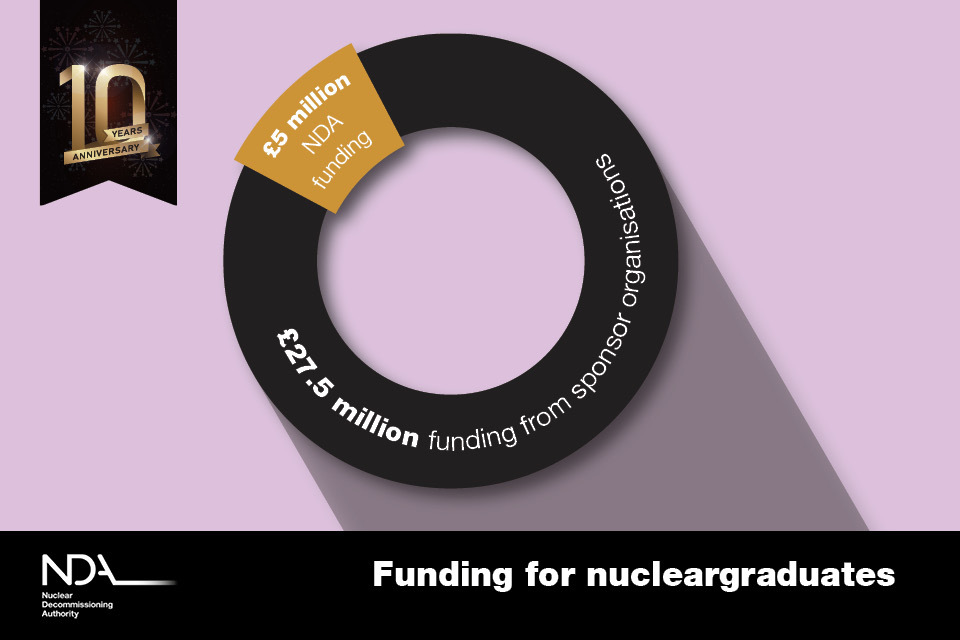
Funding for nucleargraduates; 5 million from NDA and 2.75 million from sponsor organisations
The programme offers the chance to work across five key areas across the nuclear sector - decommissioning, power generation, processing, defence and new build – and in-turn gain invaluable insight into the industry.
Decommissioning
Decommissioning is at the forefront of meeting the nuclear sector’s commercial and environmental challenges. Only by safely and efficiently managing the legacy of the nuclear industry from the past 50 years, can society have confidence in the next generation of nuclear power stations. This is most definitely long-term work, undertaken over the next century and beyond.
Power generation
Power generation makes up the best known part of the nuclear industry. Right now, the UK’s nuclear power stations already account for nearly 20% of the electricity supplied to meet national needs. A diverse range of power station designs are in use and so people with diverse skills are needed. What’s more, the growing appetite for clean, safe and reliable energy has led to the commissioning of a new wave of power stations.
Processing
Processing and reprocessing nuclear fuel is a major part of the nuclear sector. The challenges are incredibly varied and range from operating commercially in a global market, to making new advances in chemical engineering. The scale of this area should not to be underestimated and is comparable with the oil, gas, chemical and banking industries.
Defence
Defence plays an important role in the nuclear industry. Contracts are being delivered for the Ministry of Defence through suppliers such as BAE Systems and Rolls-Royce. These suppliers are located throughout the UK, and the work ranges from construction to dock maintenance.
New build
New build encompasses project management, engineering, construction and business management. For the new generation of power stations to be built, the industry needs ambitious, intelligent people, who can tackle projects as big if not bigger than the Olympic Games and London’s Cross Rail network.
Did you know?
- the nucleargraduates programme has created £78.8million in value to the UK nuclear sector over the last 10 years
- to date 344 nucleargraduates have gone through the scheme
- secondments are mapped against criteria needed by professional bodies providing graduates with the best possible experience
- graduates are hosted by different companies in different locations, at home and abroad, facing the challenge of learning a range of management styles, geographical cultures, business characteristics and how supply chains work the programme also looks at issues facing communities through dedicated groups supporting local community-run projects
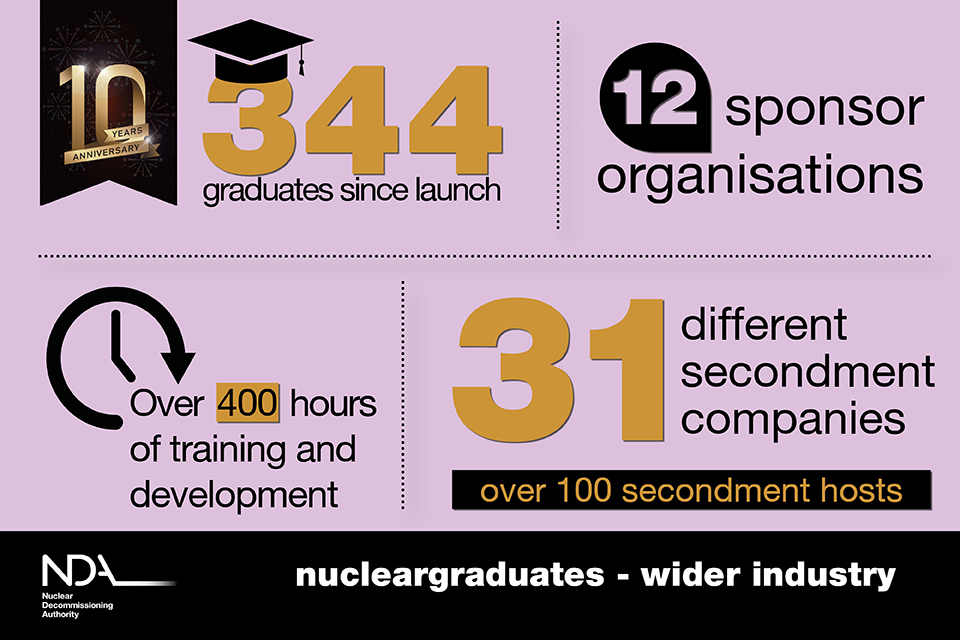
nucleargraduates facts and figures
Case study: Aislin Lenehan

Case Study for Aislin Lenehan
Aislin Lenehan, part of the current cohort 10, was attracted to working in the nuclear industry based on its history, the experience and the capability of the people working in the sector and the important role nuclear plays in the energy mix.
Despite only studying one nuclear module during her Masters degree in General Engineering, at Durham University, Aislin took the chance to be part of the nucleargraduates scheme seeing it as an opportunity to drive her own development through secondments and varied training.
The prospect of working in the energy sector really excited her and she was driven by the aim of making a difference. It’s been a passion of Aislin’s for as long as she can remember – she always loved the sciences at school and was chosen to take part in various science and engineering competitions and programmes throughout primary and secondary school.
Throughout her time on the nucleargraduates scheme she has been involved in practical workshops, technical lectures, and professional qualifications in business skills, leadership and project management. And the scheme has taken her all over the world – London, Tokyo, Germany and Canada.
During her nucleargraduates experience, Aislin has supported the UK civil nuclear industry at home and abroad in Japan working for the Department for International Trade as a sector manager covering export and investment.
My next step is to become a chartered engineer with the IMechE. I’m determined to make a positive impact in the decommissioning sector and I’m looking forward to the challenges and opportunities that await.
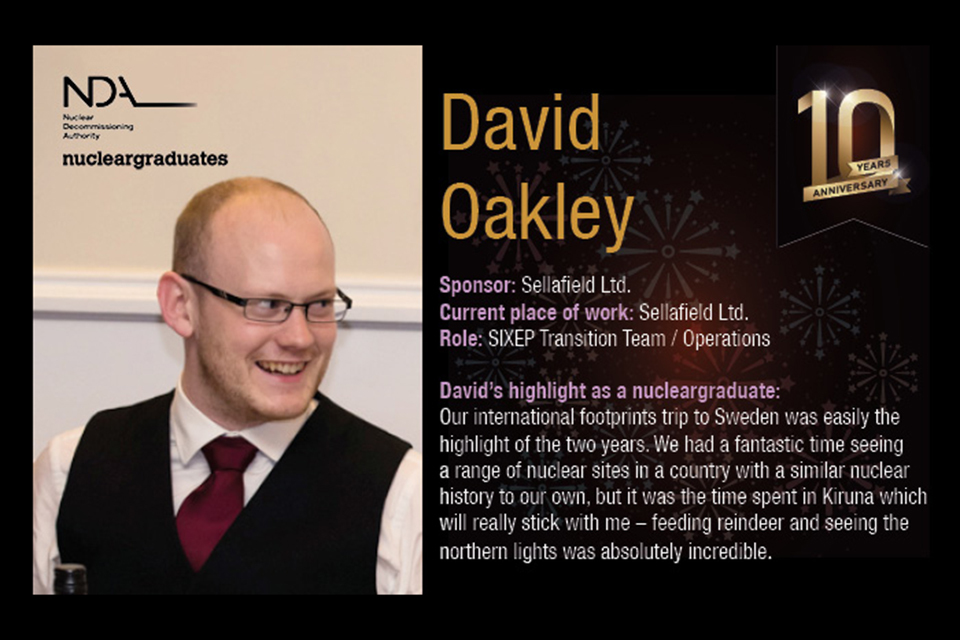
Case Study for David Oakley

Case Study for Grace Frost
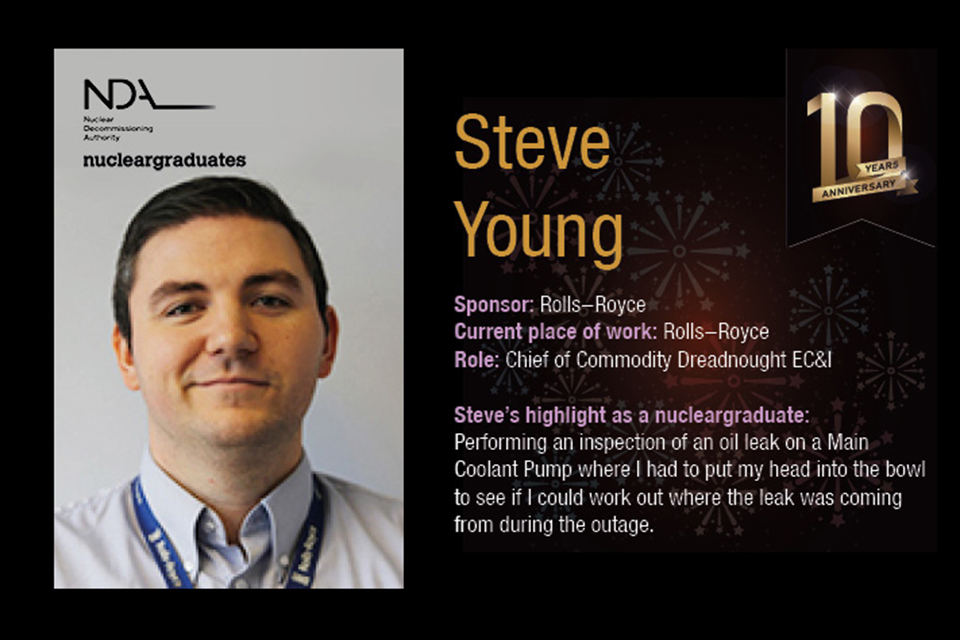
Case Study for Steve Young

